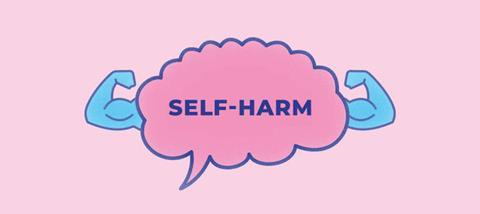Rachael Newham gives some much needed advice on a growing issue for young people

It’s important to remember that self-harm is not new – it’s seen in the Bible. In Kings 1, the prophets of Baal cut themselves as a desperate way to try and to get their gods to listen to them (1 Kings 18:28). They believe that cutting themselves is the only way to get their attention. It’s not difficult to draw parallels here to what many young people tell us about self-harming; that it’s a way of communicating distress. When words fail, something as physical and stark as self-harm communicates pain that young people don’t feel they can explain.
And it’s found in ancient text – it was a sign of mourning in the rest of the ancient Near East. The Israelites had picked this up (from the culture) and were commanded not to do it. Unlike the gods of Ball, our God cares for us and wants us to come to him with our grief rather than harming ourselves.
Young people in the 21st Century may self-harm for a multitude of different reasons –; from relationship problems, struggles at school, to mental illness and family difficulties – but underlying these difficulties are often more universal emotions. Self-harm can be used as a way to manage anger, express self-hatred, or demonstrate emotions that they don’t know how to communicate. Therefore, a key part of our response has to be rooted in helping our young people to understand their emotions and find creative ways to deal with them.
At the crux of the Christian response to self-harm is not legalism and prohibition, it’s because God loves hHis children and we are precious to Him. Self-harm hurts God’s children and he wants to call us close. God doesn’t want his creation being harmed. It’s not an arbitrary rule -– it’s the result of parental love. This is what needs to motivate our desire to see young people set free from self-harm, not because it makes us feel uncomfortable, but because we are created by God and have more value than our culture teaches.
Deuteronomy 14:1-2 tells us: “You are the children of the Lord your God. Do not cut yourselves or shave the front of your heads for the dead, for you are a people holy to the Lord your God. Out of all the peoples on the face of the earth, the Lord has chosen you to be his treasured possession.”
That being said, it’s vital that we don’t tell or ask our young people to stop self-harming because the result can be that they simply never confide in us again. Instead, use a disclosure of self-harm to listen to a young person’s fears and feelings behind the self-harm, and signpost them to any available support. There are a number of great organisations which offer support for young people who are struggling, including www.selfharm.co.uk.
It might be appropriate to run a session on emotional well-being, or coping mechanisms; recognising that self-harm is done to manage difficult feelings but pointing to other healthier ways to cope, such as music, exercise and talking. Consider getting the group to write or draw Psalms on their emotions and put them at the foot of the cross as a way to communicate their emotions to God.
When dealing with a disclosure of self-harm, make sure it is documented and that you follow your organisation’s safeguarding procedure, never promising complete confidentiality and passing your concerns on to relevant parties and ensuring that the young person is referred for any medical or psychological treatment needed.
RACHEL NEWHAM is founder of Christian mental health charity ThinkTwice (@ThinkTwiceInfo) and author of Learning to Breathe, a memoir and theological reflection on mental illness.










































